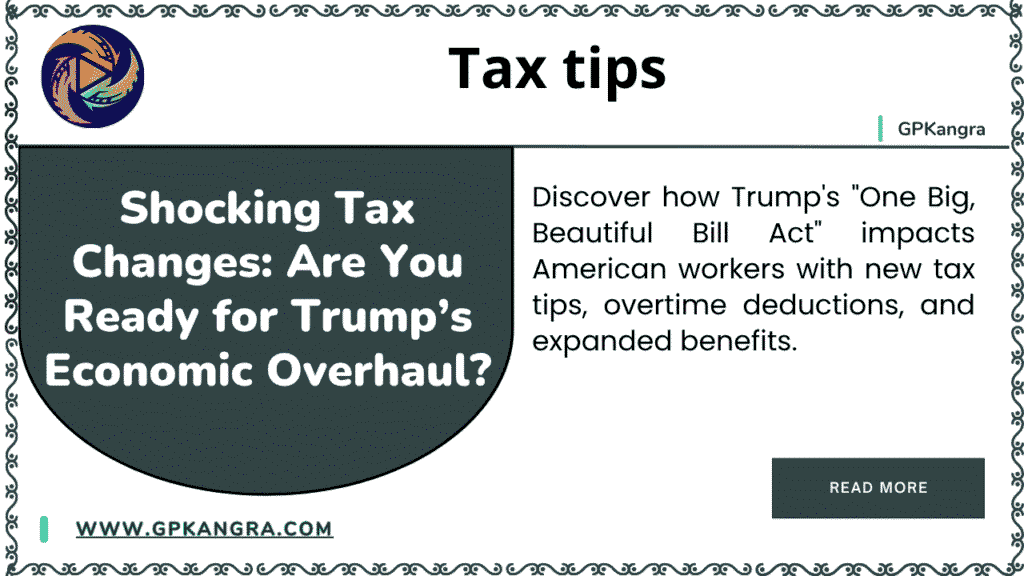Summary:
President Trump’s “One Big, Beautiful Bill Act” introduces significant changes impacting American workers’ finances, particularly with new provisions for tax-free tips and overtime. While designed to boost the economy and put more money in pockets, experts advise careful examination of the long-term implications, including potential ripple effects on wages and employer practices.
Highlights:
- Tax-Free Tips: Workers can now deduct up to $25,000 in qualified tips annually from their taxable income, effective for the 2025 tax season, with income caps.
- Overtime Tax Deduction: A new deduction allows up to $12,500 in qualified overtime compensation to be deducted, also starting in 2025 and expiring at the end of 2028.
- Workforce Development: The bill expands Pell Grants to eligible workforce programs, aiming to address the need for skilled workers in high-demand jobs.
- Employee Support: Enhanced tax credits for employer-provided childcare and permanent tax-free student loan repayment assistance aim to support working families.

Tax Tips to Triumph: Unpacking Trump’s “One Big, Beautiful Bill Act” and Its Impact on American Workers
President Donald Trump’s recently enacted “One Big, Beautiful Bill Act” is poised to reshape the financial landscape for millions of American workers. Touted as a catalyst for economic growth and a direct boost to individual incomes, particularly for hourly wage earners,
this nearly 900-page megalaw, swiftly passed and signed, carries profound and multifaceted implications that warrant a closer look. While the administration champions its benefits, experts urge a comprehensive understanding of its nuances, as the real-world outcomes may not always be as straightforward as they appear on the surface.
“The law’s passage happened overnight and on a holiday weekend,” notes Nisha Verma, a partner in Dorsey & Whitney’s labor and employment practice. “This will change the lives of Americans, but exactly how still has to be examined.” As workers prepare for these shifts, understanding the key provisions, especially those concerning tax tips, becomes paramount for financial planning and maximizing benefits.
The Game-Changer for Tipped Workers: No Tax on Tips
Perhaps one of the most talked-about provisions, and a central point of discussion in the 2024 presidential campaign, is the “no tax on tips” initiative. Both President Trump and Vice President Kamala Harris expressed support for such a measure, acknowledging the significant role tips play in the livelihoods of many service industry professionals.
- Concrete Mix Design calculator as per IS 10262 : 2019
- ITR Filing Last Date 2025: New Deadlines Announced!
- AP EAMCET Seat Allotment 2025: Your College Awaits!
Under the “One Big, Beautiful Bill Act,” workers receiving “qualified tips” will be able to deduct a substantial $25,000 annually from their taxable income. This applies to the 2025 tax season and beyond, offering a significant reprieve for those in tip-dependent roles.
The provision comes with an income cap: $150,000 for individuals and $300,000 for those filing jointly, ensuring that the benefit is primarily directed towards a broad segment of the working population. Crucially, this is an “above-the-line deduction,” meaning it benefits all taxpayers, whether they opt for the standard deduction or itemize.
However, as with any sweeping legislative change, the initial allure of “no tax on tips” presents a more complex reality. Economist Martha Gimbel, executive director and co-founder of the Budget Lab at Yale, cautions against a simplistic interpretation.
“You may be reading about this in the news and you see, no tax on tips and think, ‘That seems great for me,’ and you’re not taking the time to think about, ‘well, wait a minute, I already wasn’t paying federal income tax on my tips, because I made too much or too little money.’”
The implications extend beyond individual tax savings. Dorsey & Whitney’s Verma highlights potential “ripple effects” within the labor market, particularly in the service industry. The increased value of tips could lead to heightened scrutiny of practices like tip pooling, potentially sparking challenges from servers. Furthermore, there’s concern that the enhanced value of tips might inadvertently disincentivize employers from raising base wages or policymakers from pushing for a higher tipped minimum wage, currently set at a meager $2.13 an hour.
Verma underscores the broader challenges faced by tipped workers: “Yes, the person’s getting a benefit by not having to pay taxes on their tips, but there’s other challenges that come along with relying on tips for your income, such that you may be subject to more sexually harassing behavior, or you may not be able to advocate for yourself as much as you would want to in front of customers when you don’t even have the security of $7.25 an hour from your employer.”
It’s also important to note that, similar to the overtime tax break, this provision for tax tips is not permanent. It is set to expire at the end of 2028. The Treasury Department is expected to provide further guidance on what constitutes “qualified tips” and the specific occupations and industries that will benefit.
Overtime Compensation: A New Deduction for Hard Workers
Beyond tax tips, the “One Big, Beautiful Bill Act” introduces another significant deduction: “no tax on overtime.” This above-the-line deduction allows individuals earning up to $150,000 ($300,000 for joint filers) to deduct up to $12,500 ($25,000 for joint filers) in qualified overtime compensation. This applies to overtime hours exceeding 40 per week and takes effect for the 2025 tax year, also expiring at the end of 2028.
While the concept of tax-free overtime has gained traction in various states, critics have voiced concerns about potential unintended consequences, such as encouraging excessive working hours or creating loopholes for higher earners to exploit the system.
The practical implementation of this deduction still requires clarification. Verma points out the complexities for employers: “Not all employers only pay overtime on a federal level, which requires time and a half after 40 hours worked. There are four states (plus Oregon in some industries) where there’s a requirement on the state level to pay overtime if the person exceeds a certain number of hours worked per day.” Furthermore, many wage statements do not clearly differentiate between daily and weekly overtime, posing a logistical challenge for employers and employees alike in accurately applying this new deduction.
Beyond Direct Deductions: Investing in the Workforce
The “One Big, Beautiful Bill Act” also includes provisions aimed at long-term workforce development and support for working families. These initiatives, while not direct tax tips or immediate deductions, contribute to a stronger and more supported American workforce.
Workforce Pell Grants: A vital enhancement is the extension of the federal need-based Pell Grant to students enrolled in eligible workforce programs for high-skill, high-demand, and high-waged jobs. This expansion is designed to bridge a critical skills gap by making a broader range of postsecondary and short-term programs accessible. The provision is slated to take effect on July 1, 2026, targeting programs offering 150 to 600 hours of instruction over an eight to fifteen-week period.
Enhanced Employer-Provided Child Care Credit: Recognizing the crucial role of accessible and affordable child care in labor force participation, particularly for women, the bill increases the tax credit for employers offering child care services. Starting in the 2026 tax year, businesses can deduct up to 40% of qualified child care expenditures, up to $500,000. Small businesses receive an even greater benefit, with deductions up to 50% of qualified expenses, capped at $600,000. While a positive step, historical data suggests that employer-provided childcare has primarily been limited to larger firms, indicating a need for broader adoption.
Exclusion of Employer Payments of Student Loans: The “One Big, Beautiful Bill Act” makes permanent a previously temporary law allowing employers to offer up to $5,250 in tax-free student loan repayment assistance. Starting in the 2026 tax year, this amount will also be adjusted for inflation in $50 increments, providing ongoing relief for student loan borrowers.
However, research indicates that the primary beneficiaries of such programs are higher-earning, white-collar workers at larger employers, suggesting that the impact may not be evenly distributed across all student loan holders.
Understanding the Nuances: A Look Ahead
The “One Big, Beautiful Bill Act” represents a significant legislative undertaking with diverse implications for American workers. While provisions like tax-free tax tips and overtime deductions offer immediate financial relief, the broader effects on the labor market, employer practices, and overall economic dynamics will unfold over time.
As the Treasury Department prepares to release further guidance, and as businesses and individuals navigate these new regulations, a proactive approach to understanding these changes will be essential for maximizing benefits and adapting to the evolving financial landscape.
| Provision | Effective Date | Expiration Date | Maximum Benefit (Individual) | Income Cap (Individual) | Key Impact |
| No Tax on Qualified Tips | 2025 Tax Season | End of 2028 | $25,000 Deduction | $150,000 ($300,000 Joint) | Direct tax savings for tipped workers, potential ripple effects on wages and tip pooling. |
| No Tax on Qualified Overtime | 2025 Tax Season | End of 2028 | $12,500 Deduction | $150,000 ($300,000 Joint) | Tax savings for workers earning overtime, potential complexities in employer implementation. |
| Workforce Pell Grants | July 1, 2026 | N/A | Varies by program | Need-based | Expands access to education for high-skill, high-demand jobs. |
| Employer Child Care Credit | 2026 Tax Year | N/A | 40% of expenses (up to $500,000) | N/A | Encourages employer-provided childcare, boosting labor force participation. |
| Employer Student Loan Payments | Permanent (as of OBBB) | N/A | $5,250 (inflation-adjusted) | N/A | Tax-free student loan repayment assistance from employers, primarily benefiting higher earners. |
FAQs About the “One Big, Beautiful Bill Act” and Tax Tips
What does the “no tax on tips” provision mean for my income?
The “no tax on tips” provision allows you to deduct up to $25,000 of your qualified tips annually from your taxable income, effective for the 2025 tax season. This means you won’t pay federal income tax on that portion of your tips, potentially increasing your take-home pay.
Are there any income limitations for benefiting from the tax tips deduction?
Yes, there are income limitations. To qualify for the tax-free tips deduction, your annual income cannot exceed $150,000 if you’re filing as an individual, or $300,000 if you’re filing a joint return.
How long will the “no tax on tips” and “no tax on overtime” provisions be in effect?
Both the “no tax on tips” and “no tax on overtime” provisions are set to expire at the end of 2028. They are not permanent tax breaks.
Besides tax tips and overtime, what other benefits does the “One Big, Beautiful Bill Act” offer to workers?
The act also expands Pell Grants for workforce training programs, increases tax credits for employers who provide childcare, and makes permanent the tax-free exclusion for employer-provided student loan repayment assistance.
What are “qualified tips” under the new law, and where can I find more information?
“Qualified tips” include cash tips paid voluntarily to a person working in a traditionally tipped job or business. The Treasury Department is expected to release further guidance on specific qualifying occupations and industries. You should consult official IRS resources and tax professionals for the most up-to-date and detailed information.
Also read :
- Concrete Mix Design calculator as per IS 10262 : 2019
- ITR Filing Last Date 2025: New Deadlines Announced!

- AP EAMCET Seat Allotment 2025: Your College Awaits!

- UGC NET CUTOFF MARKS 2025 : SUBJECT / CATEGORY WISE CUTOFF MARKS

- Age 62 vs. 70: The Social Security Quick Calculator Reveals Your Perfect Retirement Sweet Spot!

Disclaimer : We gather our information from official websites and aim for accuracy and timeliness. However, some details may need further clarification or updates. Please contact us via our Contact Page with any questions or feedback, as your input helps us maintain accuracy. For the latest information, always refer to official sources.
Thank you for your understanding.
Team GPK News








